
Molecular & Cellular Toxicology
Scope & Guideline
Illuminating the pathways of toxicity in health and environment.
Introduction
Aims and Scopes
- Molecular Mechanisms of Toxicity:
Research examining the biochemical pathways and molecular interactions that lead to cellular damage or dysfunction due to toxic agents. - Cellular Responses to Toxicants:
Studies exploring the cellular responses, including apoptosis, autophagy, and inflammation, triggered by exposure to various toxic substances. - Comparative Toxicology:
Analysis of the toxic effects of substances across different biological models, including in vitro and in vivo studies, to understand species-specific responses. - Environmental Toxicology:
Investigation of the effects of environmental pollutants and their mechanisms of action on cellular and molecular levels. - Pharmacological Toxicology:
Research focused on the adverse effects of pharmaceuticals and their metabolites on cellular physiology, including drug interactions and resistance mechanisms. - Innovative Toxicological Testing Methods:
Development and application of advanced methodologies, such as omics technologies and computational models, to assess toxicological impacts.
Trending and Emerging
- Molecular Signaling Pathways:
Increasing focus on elucidating specific molecular signaling pathways involved in the cellular response to toxicants, such as MAPK, NF-κB, and PI3K/Akt pathways. - Role of Non-coding RNAs in Toxicity:
Emerging research on how non-coding RNAs (e.g., microRNAs, lncRNAs) regulate gene expression and contribute to the toxicological effects of various agents. - Nanotoxicology:
Research on the toxicological implications of nanomaterials and their interactions at the cellular and molecular levels is gaining prominence due to the increasing use of nanotechnology. - Oxidative Stress Mechanisms:
Heightened interest in the role of oxidative stress as a mediator of toxicity, with studies investigating antioxidants and their protective effects against various toxicants. - Integrative Omics Approaches:
Adoption of multi-omics techniques (genomics, proteomics, metabolomics) to provide a comprehensive understanding of toxicity mechanisms and biological responses. - Environmental Health and Toxicology:
A growing intersection between environmental health and toxicology, focusing on how environmental exposures impact human health at the molecular level.
Declining or Waning
- Traditional Toxicology Assessments:
Research heavily reliant on classical toxicological methods and models is decreasing as more sophisticated techniques and alternative models are being developed. - Single-Agent Toxicity Studies:
Investigations focusing solely on the toxic effects of single agents are becoming less prevalent, with a growing emphasis on understanding complex interactions and multi-agent exposures. - General Environmental Toxicology:
Broad studies on environmental toxicants without specific molecular or cellular focus are waning, as the field moves towards more targeted molecular investigations. - Historical Data Analysis:
Research that primarily relies on historical toxicological data without integrating contemporary molecular techniques is diminishing in favor of novel experimental approaches. - In Vivo Animal Studies:
The reliance on traditional in vivo animal studies is decreasing, with a shift towards in vitro and alternative methods that align with ethical considerations and 3Rs (Replacement, Reduction, Refinement) principles.
Similar Journals

Cardiovascular Toxicology
Advancing insights into toxic influences on cardiovascular health.Cardiovascular Toxicology is a pivotal journal dedicated to advancing the understanding of the interplay between toxic substances and cardiovascular health. Published by HUMANA PRESS INC, this journal serves as a critical resource for researchers and professionals in the fields of cardiology, toxicology, and molecular biology. With an ISSN of 1530-7905 and an E-ISSN of 1559-0259, it has established itself as a key source of high-quality research since its inception in 2001, continuing to contribute valuable insights through 2024. The journal enjoys a robust reputation, evidenced by its Q2 ranking in both Cardiology and Cardiovascular Medicine and Toxicology, along with a Q3 ranking in Molecular Biology for 2023. With Scopus rankings placing it in the 80th percentile for Cardiology and 71st for Toxicology, Cardiovascular Toxicology attracts submissions that reflect cutting-edge research and innovative methodologies. Notably, the journal prioritizes stringent peer review and scholarly rigor, ensuring that published works significantly impact the understanding of cardiovascular responses to various toxic agents. Though not an open-access journal, its content remains highly sought after in a diverse scholarly community, making it indispensable for those dedicated to enhancing cardiovascular disease prevention, diagnosis, and treatment through toxicological insights.

CELL BIOLOGY AND TOXICOLOGY
Connecting Cell Biology with Toxicological InsightsCELL BIOLOGY AND TOXICOLOGY, published by SPRINGER, stands as a vital journal within the realms of cell biology and toxicology, boasting an impressive 2023 Q1 ranking in its fields, alongside robust Scopus rankings placing it in the top 11th percentile for Toxicology and the 22nd for Health, Toxicology and Mutagenesis. With an ISSN of 0742-2091 and an E-ISSN of 1573-6822, the journal has been a cornerstone of scientific discourse since its inception in 1984, and will continue to converge innovative research until 2024. The journal focuses on the interplay between cellular mechanisms and toxicological implications, making it an essential resource for researchers, healthcare professionals, and students keen on advancing their understanding of these critical areas. Although it does not offer open access, its high impact and prestigious standing ensure that its publications reach a wide audience dedicated to significant advancements in the life sciences.

Forensic Toxicology
Decoding Toxicological Evidence for JusticeForensic Toxicology is a premier journal published by Springer, renowned for delivering cutting-edge research in the realms of toxicology, biochemistry, and forensic medicine. With an ISSN of 1860-8965 and an E-ISSN of 1860-8973, this journal has established itself as a significant resource for professionals, researchers, and students engaged in the analysis of toxic substances within a forensic context. Its impressive impact factor and ranking reveal its influential presence in the field, particularly as it is categorized in Q1 for Pathology and Forensic Medicine and Q2 for Biochemistry (Medical) and Toxicology. Featured articles span a wide array of topics, facilitating interdisciplinary collaboration and advancing scientific knowledge. While currently not an open-access journal, it remains accessible through institutional subscriptions. With a convergence span from 2006 to 2024, Forensic Toxicology is committed to publishing high-quality research that enhances the understanding of toxicological phenomena and their implications in forensic investigations, reinforcing its role as an indispensable resource in the scientific community.

International Journal of Medical Toxicology and Forensic Medicine
Exploring Critical Issues in Toxicology and Forensic ScienceInternational Journal of Medical Toxicology and Forensic Medicine, published by Shaheed Beheshti Medical University of Medical Sciences & Health Services, is a pioneering platform dedicated to advancing knowledge within the critical fields of toxicology and forensic medicine. Established as an Open Access journal since 2011, it ensures wide dissemination of research findings, catering to a global audience of researchers, healthcare professionals, and students. With an ISSN of 2251-8762 and an E-ISSN of 2251-8770, the journal covers a diverse range of topics relevant to the medical community, albeit being categorized as Q4 in both Pathology and Forensic Medicine and Toxicology in 2023, indicating emerging significance in these disciplines. Geographically based in Tehran, Iran, it aspires to bridge gaps in scientific research and practice, particularly in regions where such expertise is critical. The journal welcomes submissions that investigate pressing issues in medical toxicology and forensic science, fostering an interdisciplinary dialogue essential for innovative solutions and improved public health outcomes.
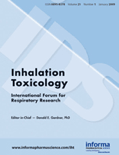
INHALATION TOXICOLOGY
Innovating Understanding of Toxic Responses to Inhalants.Inhalation Toxicology, published by Taylor & Francis Ltd, is a premier journal dedicated to advancing the field of toxicology with a particular focus on inhalation exposure and its impact on human health. Established in 1989, this journal provides a vital platform for original research, reviews, and case studies that explore the toxicological effects of inhaled substances, making it essential reading for researchers, health professionals, and regulatory scientists. With an Impact Factor that situates it in the Q3 category in both Health, Toxicology and Mutagenesis, the journal asserts its relevance within the scientific community, particularly emphasizing its contributions as indexed by Scopus rankings in related fields. Although it follows a traditional access model, the journal's commitment to delivering high-quality research continues to foster significant discussions and advancements in understanding inhalation toxicology. For those at the forefront of environmental science and pharmacology, Inhalation Toxicology is an indispensable resource for both current research and future innovations in the discipline.
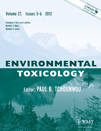
ENVIRONMENTAL TOXICOLOGY
Decoding the Complexities of Environmental ToxinsENVIRONMENTAL TOXICOLOGY, published by Wiley, is a premier academic journal dedicated to the multifaceted study of toxic substances in the environment and their effects on human health and ecosystems. With the ISSN 1520-4081 and E-ISSN 1522-7278, this journal holds a prestigious position in the field, being ranked in the Q1 category across various relevant disciplines, including Health, Toxicology and Mutagenesis, and Management, Monitoring, Policy and Law. The journal regularly publishes high-quality research articles, reviews, and policy discussions aimed at understanding the implications of environmental toxins from 1980 to the present, contributing to the body of knowledge critical for the safety and sustainability of our environment. Researchers and professionals will find a treasure trove of information that not only highlights current trends and methodologies but also sets the stage for future advancements in toxicology. As a key resource, it provides valuable insights necessary for policy-making, environmental management, and public health, reinforcing its significance in the ever-evolving fields of toxicology and environmental science.
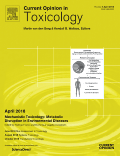
Current Opinion in Toxicology
Empowering Professionals with Timely Toxicology InsightsCurrent Opinion in Toxicology is a premier academic journal published by Elsevier, focusing on the latest advancements and perspectives in the field of toxicology. With an impressive impact factor reflecting its high citation and influence within the research community, this journal ranks in the Q1 category for Toxicology, positioned at #8 out of 133 in the Scopus Toxicology domain, placing it in the 94th percentile. The journal aims to provide concise and insightful reviews of contemporary research, fostering an understanding of critical issues related to toxic effects of chemicals and environmental agents. Although not an open access journal, it attracts a worldwide readership, making it an essential resource for researchers, professionals, and students committed to understanding toxicological science. Based in the Netherlands, Current Opinion in Toxicology serves as a platform for stimulating scholarly dialogue and guiding future research directions in this vital area of study.
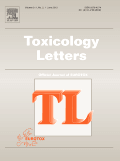
TOXICOLOGY LETTERS
Pioneering research at the intersection of toxicology and safety.TOXICOLOGY LETTERS is a prominent journal dedicated to advancing the field of toxicology, providing a platform for high-quality research and reviews that explore the effects of chemical substances on biological systems. Published by Elsevier Ireland Ltd, this peer-reviewed journal has established itself as a vital resource in toxicological research since its inception in 1977, with a convergence of studies extending to 2024. With an impressive Scopus ranking, positioned at #28 out of 133 in the Toxicology category, TOXICOLOGY LETTERS garners a respectable percentile of 79, highlighting its significance in the academic community. Although it is not an open-access journal, its research is accessible through institutional subscriptions, ensuring that critical insights into human health and environmental safety are disseminated effectively. Being categorized in the Q2 quartile in both Medicine (miscellaneous) and Toxicology for 2023 further emphasizes its relevance and impact in these fields. This journal aims to foster collaboration between researchers and professionals, encouraging the exploration of innovative solutions to chemical hazards and the promotion of safer practices in pharmacology and toxicology.

Toxicology Research
Connecting researchers to critical toxicological insights.Toxicology Research is a distinguished journal dedicated to advancing the field of toxicology through the dissemination of high-quality research. Published by Oxford University Press, this UK-based journal focuses on critical aspects of toxicology and mutagenesis, highlighting both environmental and pharmacological implications. With an ISSN of 2045-452X and an E-ISSN of 2045-4538, it serves as a valuable resource for researchers, professionals, and students alike. Currently categorized in the Q3 quartile for Health, Toxicology and Mutagenesis, as well as Toxicology in 2023, Toxicology Research maintains a visible presence in Scopus rankings, positioning itself within the targeted professional community. Although the journal operates without open access options, its importance in contributing to scientific discussions and policy formation is undeniable. Covering content from 2012 to 2024, it continues to provide insights into contemporary toxicological challenges, thereby fostering interdisciplinary collaborations and informing best practices in health and safety.
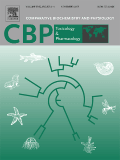
COMPARATIVE BIOCHEMISTRY AND PHYSIOLOGY C-TOXICOLOGY & PHARMACOLOGY
Innovating Insights in Comparative Toxicology ResearchComparative Biochemistry and Physiology C-Toxicology & Pharmacology, published by Elsevier Science Inc, stands as a prominent resource in the fields of pharmacology, toxicology, and biochemical research. With its ISSN 1532-0456 and E-ISSN 1878-1659, this journal has carved out a significant niche, focusing on the comparative aspects of biochemical and physiological data across various species. Recognized for its impact in diverse fields, it boasts a Q1 ranking in Animal Science and Zoology, Aquatic Science, Health, Toxicology and Mutagenesis, alongside respectable standings in other related disciplines. Researchers and professionals can leverage this publication to access high-quality, peer-reviewed studies that advance the understanding of biochemical processes and their toxicological implications. The journal aims to bridge the gap between laboratory findings and real-world applications, fostering an environment for interdisciplinary collaboration. For academics seeking to enhance their knowledge or contribute to this impactful field, Comparative Biochemistry and Physiology C-Toxicology & Pharmacology serves as an invaluable platform.